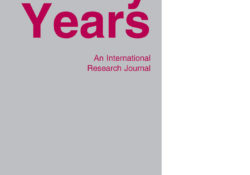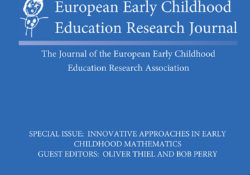tandfonline.com har udgivet en rapport under søgningen “Teacher Education Mathematics”: ABSTRACT ABSTRACT In mathematics education, digital tools have been used to enhance young children’s understanding of specific subject matter. In such implementations, the digital tool can replace, amplify or transform ‘ordinary’ mathematics teaching. In an initial study, systematization and duplication were identified as critical when young children were to solve a combinatorial task. Therefore, a digital version of the task was developed and combined with a non-digital version, to introduce the use of dual artefacts. The digital version of the task enabled the children to visually explore systematization as well as the principle of completion. After using this digital version of the task, the children’s written records became more systematic and included fewer duplications. We conclude that the digital version… Continue Reading →
Like this:
Like Loading...
tandfonline.com har udgivet en rapport under søgningen “Teacher Education Mathematics”: ABSTRACT ABSTRACT This study explores preschool children’s mathematizing in everyday block play activities. Building on an ethnomethodological and multimodal conversation analytic framework, we explore how geometry (i.e. spatiality, shape, and symmetry) is actualized in children’s verbal and embodied interaction with their peers, pedagogues, and material environment. The selected data are drawn from a video ethnographic study in a Swedish preschool in which a boy and a girl play with a magnetic construction toy. The results of the study demonstrate how the participants orient to spatial locations, properties, dimensions, orientations, transformations, and shapes as they build a house. The children are shown to rely upon verbal and embodied resources such as deictics (e.g. here, there, these) and pointing gestures as geometrical aspects are… Continue Reading →
Like this:
Like Loading...
tandfonline.com har udgivet en rapport under søgningen “Teacher Education Mathematics”: ABSTRACT ABSTRACT With the aim of exploring how children discuss underlying reasons for evolution and how materials function in children’s meaning making processes, this article provides insight into how evolution theory can be introduced in preschool and in the early years of primary school. Video data from eight group discussions (N = 27) were analyzed using a multimodal perspective. Despite not having had any formal instruction about evolution theory, the 6-year-old children in this study made use of their previous experiences and the materials to make meaning and argue for different reasons for animal diversity. The results show that the children’s discussions concerned four conceptual themes: animals are different because of kinship and heredity, environmental effects, the need for adaptation, and the… Continue Reading →
Like this:
Like Loading...
eric.ed.gov har udgivet: This study used qualitative data to analyze how fathers in a rural Pennsylvania prison were involved in their children’s literacy, learning, and education before and during incarceration and through the Read to Your Child/Grandchild (RYCG) program. Before RYCG, most fathers took steps such as reading to children, teaching reading and math, attending parent-teacher conferences, helping with homework, and singing and rhyming–and then sought to continue supporting their children’s learning from within prison. Drawing on interviews and observational data, the authors analyzed the experiences and perspectives of 11 fathers to address the following research questions: (1) How were fathers in a rural Pennsylvania prison involved in their children’s literacy, learning, and education before and during their incarceration? and (2) How did the fathers use RYCG to support their… Continue Reading →
Like this:
Like Loading...
eric.ed.gov har udgivet: In response to rising parental incarceration, some correctional facilities and outside organizations offer family literacy programs for parents in prison. However, research on these correctional education initiatives is scant. This paper uses qualitative data to analyze how 11 fathers in a rural Pennsylvania prison were involved in their children’s literacy, learning, and education before and during incarceration and through the Read to Your Child/Grandchild (RYCG) program. Before RYCG, most fathers had taken steps such as reading to children, teaching reading and math, attending parent-teacher conferences, helping with homework, and singing and rhyming–and then sought to continue supporting their children’s learning from within prison. Fathers used RYCG materials (video-recorded book reading, children’s book, scrapbook) to emphasize the importance of education, literacies, and numeracy. They also created personalized scrapbooks… Continue Reading →
Like this:
Like Loading...
eric.ed.gov har udgivet: Today it is critical to excite young people about mathematics in our high-tech STEM world we live in. Math teachers today need to embolden students to be confident in their ability to solve problems, to think and use their imaginations, to understand mathematical concepts, to be creative, and to see math as a human endeavor. The author feels that as students feel less anxious about, and more confident in their abilities to do math their performance will improve. The author has provided an in-depth literature review and offers background information on using children’s literature to teach mathematics; sharing the methods and materials possible to incorporate such literature into such math instruction in a wide range of mathematics strands. The results of using such literature in the teaching… Continue Reading →
Like this:
Like Loading...
eric.ed.gov har udgivet: This validity study examined the validity of Assessment, Evaluation, and Programming System, 2nd Edition (AEPS®), a curriculum-based, authentic assessment for infants and young children. The primary purposes were to: a) examine whether the AEPS® is a concurrently valid tool for measuring young children’s language, literacy and pre-math skills for accountability purpose and b) explore teachers’ perceptions on using authentic assessment and standardized tests. This was accomplished through implementing both quantitative and qualitative methods. Findings from the study indicated (a) the AEPS® is a concurrently valid (b) there were both advantages and disadvantages of using authentic assessment such as the AEPS® and using standardized tests based on teachers’ perceptions, however, the practical issues of using the authentic measure can be addressed by providing in-depth trainings to teachers and… Continue Reading →
Like this:
Like Loading...
eric.ed.gov har udgivet: The “Building Blocks PreK Math Curriculum” (Clements & Sarama, 2007) was designed to facilitate children’s engagement in math and talk about math. Much research investigates the effect of curriculum on classrooms or teacher practices. This study used a mediational model to look at a curriculum’s effect on children’s achievement gain, operating through specific child behaviors in the classroom. Specifically, this study looked at how a math curriculum affected children’s focus in math alone or in all learning activities (math, literacy, science, social-studies, and other), talking during math-related activities or in all learning activities, and engagement during math or during all learning activities. Additionally, this study examined how those child behaviors predicted children’s math achievement gain. It is hypothesized in the existing literature that much of the variability… Continue Reading →
Like this:
Like Loading...
eric.ed.gov har udgivet: The current study, a randomized controlled trial, explores how technology and educational transmedia resources can enhance prekindergarten math teaching and learning in preschools, especially those serving children who may be at risk for academic difficulties due to economic and social disadvantages. This research is part of a multi-year summative evaluation of the CPBPBS Ready To Learn initiative, funded by the US Department of Education. A core aim of the initiative is delivering early math (and literacy) resources on new and emerging digital platforms such as tablet computers, interactive whiteboards, and smartphones, as well as better-established technologies such as computers, video displays, and gaming consoles, and to create learning experiences that leverage the unique capabilities of these various technology platforms. The study’s goal was to understand how the… Continue Reading →
Like this:
Like Loading...
eric.ed.gov har udgivet: “MyTeachingPartner–Math/Science” (“MTP-MS”) is a system of two curricula (math and science) plus teacher supports designed to improve the quality of instructional interactions in pre-kindergarten classrooms and to scaffold children’s development in mathematics and science. The program includes year-long curricula in these domains, and a teacher support system (web-based supports and in-person workshops) designed to foster high-quality curricular implementation. This study examined the impacts of the intervention on the development of mathematics and science skills of 444 children during pre-kindergarten, via school-level random assignment to two intervention conditions (“Basic: MTP-M/S” mathematics and science curricula, and “Plus: MTP-M/S” mathematics and science curricula plus related teacher support system) and a Business-as-Usual control condition (“BaU”). There were intervention effects for children’s knowledge and skills in geometry and measurement as well as… Continue Reading →
Like this:
Like Loading...


